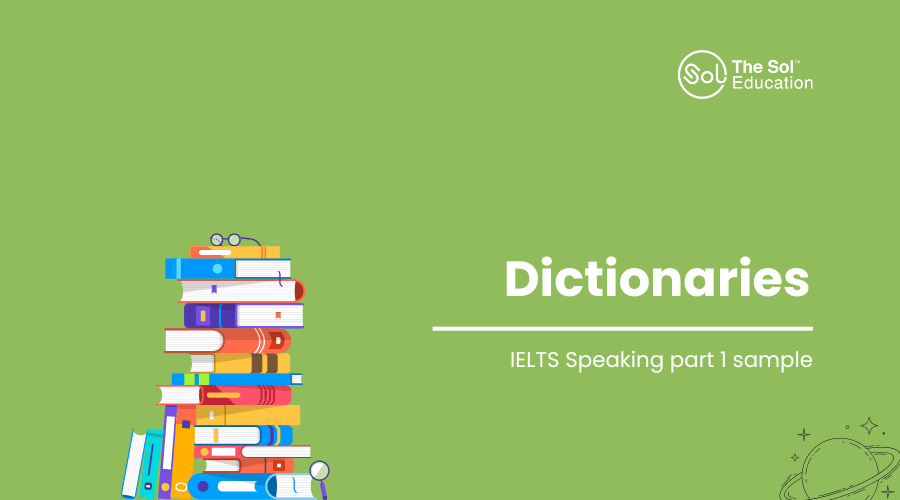Trong bài thi IELTS Speaking, phần thi Speaking part 1 là phần thi đơn giản nhất nhưng cũng rất quan trọng, giúp giám khảo tạo được ấn tượng tốt với thí sinh và ước lượng band điểm. Chính vì thế The SOL Education đã dành nhiều tâm huyết dành cho chuyên mục “Sample answers for the IELTS Speaking part 1”, bao gồm những bài nói mẫu thuộc phần thi thứ nhất nhằm giúp các bạn có một khởi đầu tốt nhất.
Trong bài viết này, chúng ta sẽ tìm hiểu về chủ đề “Dictionaries” (Từ điển) nhé.
Trong bài thi IELTS Speaking, phần thi Speaking part 1 là phần thi đơn giản nhất nhưng cũng rất quan trọng, giúp giám khảo tạo được ấn tượng tốt với thí sinh và ước lượng band điểm. Chính vì thế The SOL Education đã dành nhiều tâm huyết dành cho chuyên mục “Sample answers for the IELTS Speaking part 1”, bao gồm những bài nói mẫu thuộc phần thi thứ nhất nhằm giúp các bạn có một khởi đầu tốt nhất.
Trong bài viết này, chúng ta sẽ tìm hiểu về chủ đề “Dictionaries” (Từ điển) nhé.

1. Have you ever used a dictionary?
- Band 6.5 Sample: Yes, I have used a dictionary before, especially during my school years when learning English. I would refer to it occasionally to look up unfamiliar words or understand their meanings in different contexts.
- Band 8.0 Sample: Certainly, I have used dictionaries extensively throughout my education. They were indispensable tools for expanding my vocabulary, grasping nuanced meanings, and improving my language proficiency, particularly in English
- Refer to (phrase): /rɪˈfɜːr tuː/ - tham khảo, tra cứu
- Used dictionaries extensively (phrase): /juːzd ˈdɪkʃəˌnɛrɪz ɪksˈtɛnsɪvli/ - sử dụng từ điển một cách rộng rãi
- Indispensable tools (phrase): /ˌɪndɪˈspɛnsəbl tuːlz/ - công cụ không thể thiếu
- Grasping nuanced meanings (phrase): /ˈɡræspɪŋ ˈnuːɑːnst ˈmiːnɪŋz/ - nắm bắt ý nghĩa tinh tế
- Improving my language proficiency (phrase): /ɪmˈpruːvɪŋ maɪ ˈlæŋɡwɪdʒ prəˈfɪʃənsi/ - cải thiện khả năng sử dụng ngôn ngữ của mình
2. Do you prefer paper or electronic dictionaries?
- Band 6.5 Sample: I don't have a strong preference between paper and electronic dictionaries. I've used both, and each has its advantages. Paper dictionaries offer a tangible experience, while electronic ones are convenient and provide quick access to definitions.
- Band 8.0 Sample: I appreciate the convenience of electronic dictionaries, especially with features like pronunciation guides and example sentences. However, there's a nostalgic charm in using paper dictionaries, and I find the tactile experience of flipping through pages enjoyable.
- Tangible experience (phrase): /ˈtændʒəbl ɪksˈpɪərɪəns/ - trải nghiệm có thể chạm vào
- Quick access to definitions (phrase): /kwɪk ˈæksɛs tuː ˌdɛfɪˈnɪʃənz/ - truy cập nhanh chóng đến các định nghĩa
- Nostalgic charm (phrase): /nɒˈstældʒɪk tʃɑːm/ - sự quyến rũ đầy hồi ức
- Tactile experience (phrase): /ˈtæktaɪl ɪksˈpɪərɪəns/ - trải nghiệm có thể cảm nhận thông qua cảm giác xúc giác
- Flipping through pages (phrase): /ˈflɪpɪŋ θruː peɪdʒɪz/ - lật qua các trang
3. Are dictionaries used a lot in your foreign language classes?
- Band 6.5 Sample: Dictionaries are occasionally used in foreign language classes. Teachers encourage us to rely on context and language immersion, but dictionaries are available for reference when encountering challenging vocabulary.
- Band 8.0 Sample: Yes, dictionaries play a significant role in foreign language classes. They are valuable resources for students to independently explore and understand the nuances of language. Teachers often integrate dictionary exercises to enhance our language skills.
- Language immersion (phrase): /ˈlæŋɡwɪdʒ ɪˈmɜːrʒən/ - sự đắm chìm trong ngôn ngữ
- Play a significant role (phrase): /pleɪ ə sɪɡˈnɪfɪkənt roʊl/ - đóng vai trò quan trọng
- Understand the nuances of language (phrase): /ˌʌndərˈstænd ðə ˈnuːɑːnsɪz əv ˈlæŋɡwɪdʒ/ - hiểu sự tinh tế của ngôn ngữ
- Enhance our language skills (phrase): /ɪnˈhæns aʊər ˈlæŋɡwɪdʒ skɪlz/ - nâng cao kỹ năng ngôn ngữ
4. Do you think dictionaries are useful?
- Band 6.5 Sample: Dictionaries are useful to some extent. They can help clarify meanings, but language learning involves more than just memorizing definitions. Practical usage and context are equally important.
- Band 8.0 Sample: Absolutely, dictionaries are invaluable tools for language learners. They provide a comprehensive understanding of words, offer insights into proper usage, and serve as essential aids in building a rich and nuanced vocabulary.
- Useful to some extent (phrase): /ˈjusfəl tuː sʌm ɪkˈstɛnt/ - hữu ích đến một mức độ nào đó
- Memorizing definitions (phrase): /ˈmɛməˌraɪzɪŋ ˌdɛfɪˈnɪʃənz/ - ghi nhớ định nghĩa
- Equally important (phrase): /ˈikwəli ɪmˈpɔːrtənt/ - quan trọng ngang nhau
- Invaluable tools (phrase): /ɪnˈvæljuəbl tuːlz/ - công cụ vô giá
- Comprehensive understanding (phrase): /ˌkɒmprɪˈhɛnsɪv ˌʌndəˈstændɪŋ/ - hiểu biết toàn diện
- Offer insights into (phrase): /ˈɒfər ˈɪn.saɪts ˈɪntuː/ - cung cấp cái nhìn sâu sắc vào
- Proper usage (phrase): /ˈprɒpər ˈjuːsɪdʒ/ - cách sử dụng đúng đắn
- Essential aids (phrase): /ɪˈsɛnʃəl eɪdz/ - hỗ trợ quan trọng
- Building a rich and nuanced vocabulary (phrase): /ˈbɪldɪŋ ə rɪʧ ænd ˈnuːɑːnst ˈvəʊ.kæbjʊˌlɛri/ - xây dựng một từ vựng phong phú và tinh tế
5. How will dictionaries change in the future?
- Band 6.5 Sample: In the future, dictionaries might become more digital and interactive. With advancements in technology, we could see features like augmented reality or real-time language translation integrated into dictionaries.
- Band 8.0 Sample: The future of dictionaries holds exciting possibilities. We may witness more sophisticated language recognition technology, personalized learning features, and integration with language learning apps, making dictionaries even more dynamic and adaptive.
- Advancements in technology (phrase): /ədˈvænsmənts ɪn tɛkˈnɒlədʒi/ - sự tiến bộ trong công nghệ
- Augmented reality (phrase): /ɔːɡˈmɛntɪd əˈrɛləti/ - thực tế ảo
- Real-time language translation (phrase): /riəl-taɪm ˈlæŋɡwɪdʒ trænsˈleɪʃən/ - dịch ngôn ngữ trong thời gian thực
6. If someone gave you a dictionary as a gift, how would you feel?
- Band 6.5 Sample: Receiving a dictionary as a gift would be okay. While it might not be the most exciting gift, I would appreciate the thought behind it, especially if it's a specialized or beautifully crafted dictionary.
- Band 8.0 Sample: I would feel delighted to receive a dictionary as a gift. It demonstrates a thoughtful consideration for my interests in language and learning. A well-chosen dictionary could be a valuable addition to my collection.
- Demonstrates thoughtful consideration (phrase): /ˈdɛmənˌstreɪts ˈθɔtfəl kənˌsɪdəˈreɪʃən/ - chứng minh sự cân nhắc chu đáo
- Well-chosen dictionary (phrase): /wɛl-ˈʧoʊzən ˈdɪkʃəˌnɛri/ - từ điển được chọn lựa cẩn thận
- Valuable addition to my collection (phrase): /ˈvæljuəbl əˈdɪʃən tuː maɪ kəˈlɛkʃən/ - bổ sung có giá trị cho bộ sưu tập của tôi
7. Do you think it would be interesting to write a dictionary?
- Band 6.5 Sample: Writing a dictionary seems like a tedious task. It requires extensive knowledge and research. While it could be interesting to delve deep into language, it might not appeal to everyone.
- Band 8.0 Sample: Indeed, the idea of writing a dictionary is fascinating. It involves delving into the intricacies of language, exploring etymologies, and capturing the evolving nature of words. It's a challenging but intellectually rewarding endeavor.
- Tedious (adj): /ˈtiːdiəs/ - mệt mỏi, nhàm chán
- Extensive knowledge (phrase): /ɪkˈstɛnsɪv ˈnɒlɪdʒ/ - kiến thức sâu rộng
- Delve deep into (phrase): /dɛlv diːp ˈɪntuː/ - đào sâu vào
- Delving into the intricacies of language (phrase): /ˈdɛlvɪŋ ˈɪntuː ðə ˈɪntrɪkəsiz əv ˈlæŋɡwɪdʒ/ - đào sâu vào những sự phức tạp của ngôn ngữ
- Exploring etymologies (phrase): /ɪkˈsplɔrɪŋ ˌɛtɪˈmɒlədʒiz/ - khám phá nguồn gốc từ ngữ
- Capturing the evolving nature of words (phrase): /ˈkæptʃərɪŋ ðə ɪˈvɒlvɪŋ ˈneɪtʃər əv wɜːdz/ - bắt gọn bản chất phát triển của từ ngữ
Nếu bạn còn đang gặp khó khăn khi trả lời các câu hỏi IELTS Speaking part 1 thì có thể đọc thêm bài viết Hai dạng câu hỏi trong IELTS Speaking part 1 và cách trả lời đạt điểm cao hoặc Các chủ đề và câu hỏi thường gặp trong IELTS Speaking part 1 - Hướng dẫn trả lời chi tiết nhé.
Hãy chuẩn bị cho mình một tâm lý thoải mái nhất khi bước vào phòng thi để đạt điểm cao!

